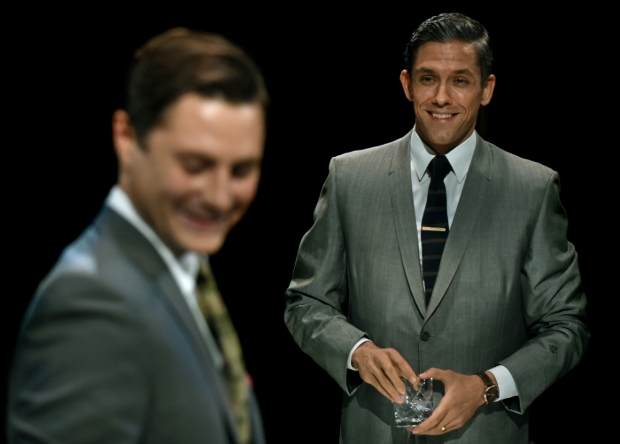The Pride

(© Kevin Parry)
Alexi Kaye Campbell's The Pride juxtaposes homosexuality in both the repressed world of 1958 London and the more liberated 2008. Whether people are trapped by society's morality or by their own self-sabotaging instincts, love proves to be a true test of wills. Though the script can be didactic and overlong, the new production at the Wallis Annenberg Center for the Performing Arts features a top-notch cast who bring humanity to the characters.
The play tracks two separate gay relationships. In 1958, Philip (Neal Bledsoe) embarks on an affair with his wife's employer, Oliver (Augustus Prew), both hating himself and resenting Oliver for the urges he can't control. In 2008, another Oliver (also played by Prew) has sabotaged his relationship with his partner, Philip (Bledsoe), by incessantly cheating on him. Both relationships are doomed. The play suggests (particularly by having the same actors play separate characters with the same names) that the repression gay men suffered in the past haunts the current stock of young men, leading them to pursue sex at the expense of a substantive relationship.
Campbell’s stylized version of the late 1950s culls the conventions of the drawing-room melodrama. Casual conversations drip with subtext. He counterbalances that period with the raw sexuality of modern times. Unfortunately, the author has not delved deep enough into the subject to warrant two-and-a-half hours of talk. He doesn't even offer a theory for why, after 40 years of liberation, the gluttony of anonymous sex still shackles some people. The play labels the 2008 Oliver a sex addict, but resolves his and Philip's romance without acknowledging the monkey still on Oliver's back. The 1958 sequence is more problematic, with a violent confrontation in which the perpetrator is the sequence’s hero.
Director (and Wallis Annenberg Center artist-in-residence) Michael Arden sets a modish mood. Transitioning between scenes, he has a 1958 character staring into the soul of a 2008 character, as if begging the latter to learn from mistakes of the past, while the 2008 character glares back almost judgmentally. The costume changes are done onstage, choreographed with the precision of a musical number.
The production is nimbly acted. Prew differentiates his Olivers through body language. The 1958 Oliver stands rigidly, with his hands interlocked behind his back as if he's hiding something, while in 2008, he's much more physically pliant and at home in his own quirkier skin. Bledsoe projects suave, James Bond-like charm, yet his bubbling frustration is apparent even in the trivial scenes. As Philip's cuckolded wife in the 1958 scenes and Oliver's best friend in the 2008 scenes, Jessica Collins masterfully conveys the buttoned-up aggravation of a woman trapped in a loveless marriage due to circumstances she could not control. Her powerful scene in which she confronts betrayal head-on is heartbreaking. In a smaller role, Matthew Wilkas is hilarious as a snappy rent boy in Act 1 and as an oblivious millennial in Act 2.
Arden's scenic concept (executed by the Wallis production team) of a checkerboard floor that, when lit up, gives the optical illusion of an abyss of metal stretching to the center of the earth, creates the perception that the characters are sinking into an endless pit of despair. Danae Iris McQueen’s costumes for 1958 are tight fitted suits, and Collins’s hair is in a rigid bun, a visual of the repressive time. The 2008 characters wear loose T-shirts, torn jeans, and open bathrobes.
Michael Arden's staging of The Pride does its best to breathe life into the drama, as does its intelligent cast. But while Campbell cleverly weaves history together, the characters' purpose ultimately gets lost, leaving the play to feel like little more than a gimmick.











